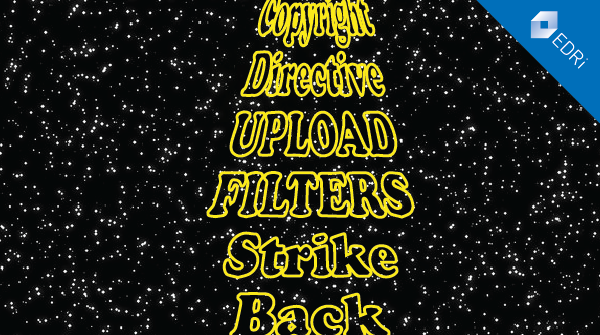Copyright Directive: Upload filters strike back
The behind-closed-doors discussions between the European Parliament negotiating team, EU Member States and the European Commission on the copyright Directive finalised last night with an agreement. The text, prepared by France and Germany, will be put to a vote between March and April in the European Parliament and could become law soon afterwards. The copyright Directive, originally aimed at “modernising” the copyright framework, has fallen short of those expectations. Instead, it forces the implementation of upload filters and brings only minor improvements in other areas. The proposal could lead to unlawful restrictions on freedom of speech and reduce access to knowledge.
The secret discussions have ended with the worst version of the “Censorship machine” we have seen so far. Citizens need to react, once again, to prevent these upload filters that threaten our freedom of expression from becoming reality.
– said Diego Naranjo, Senior Policy Advisor at European Digital Rights
If the unofficial text available is confirmed, it is in essence a transposition of the bilateral Franco-German deal reached last week. In its current version, Article 13 will bring direct liability for hosting providers.
Internet hosting services would be automatically considered to be performing a “communication to the public” when copyrighted material (or “other subject matter”) is hosted by them, regardless of whether it was uploaded by the company itself or by a user. The internet services shall then make “best efforts” to conclude licensing agreements with the rightsholders on any piece of copyrighted material (potentially every article, image, audio file and video uploaded to the internet). It is unclear how that will work in practice. Nevertheless, the elimination of the intermediate liability exception will likely leave companies no choice than to monitor every piece of content that is shared and uploaded on their platforms.
The only services to be exempted from liability, as introduced in the final deal, would be the few platforms that would fulfil the accumulative criteria that the online platform is:
(a) less than three years old
(b) making less than 10 million Euro annual turnover and
(c) visited by less than 5 million unique visitors a month.
One MEP and two big member states have turned music investors into legislators, despite input from academics, the inventor of the World Wide Web, civil society and even the UN Special Rapporteur on Freedom of Expression. It is now up to people across EU to set the record straight and make their voice heard.
– added Diego Naranjo (EDRi).
This proposal has worsened many better versions that were discussed before in the European Parliament. It further ignores the main critique against Article13 – upload filters empower (mostly US-based) Big Tech companies to decide on restrictions on freedom of speech in the EU.
The vote on the final text will likely be cast in the EP plenary in late March or early April. We will continue to push for a substantial reform of the flawed provisions in the run-up to the vote. EDRi calls on everyone committed to a free and uncensored internet to raise their voice and contact MEP’s through the #SaveYourInternet campaign.
Contribution by Yannic Blaschke and Diego Naranjo

Read more:
Unofficial Trilogue Agreement on Article 13
https://edri.org/files/copyright/20190214-Art_13_unofficial.pdf
Franco-German tandem strikes dangerous deal on copyright
(08.02.2019)
https://edri.org/copyright-franco-german-tandem-strikes-dangerous-deal-on-article-13/
Copyright: Open Letter calling for the deletion of Articles 11 and
13
(29.01.2019)
https://edri.org/20190129-coalition-deletion-art-11-and-13/
Copyright: Compulsory filtering instead of obligatory filtering –
a compromise?
(04.09.2018)
https://edri.org/copyright-compulsory-filtering-instead-of-obligatory-filtering-a-compromise/
How the EU copyright proposal will hurt the web and Wikipedia
(02.07;2018)
https://edri.org/how-the-eu-copyright-proposal-will-hurt-the-web-and-wikipedia/
EU Censorship Machine: Legislation as propaganda? (11.06.2018)
https://edri.org/eu-censorship-machine-legislation-as-propaganda/

